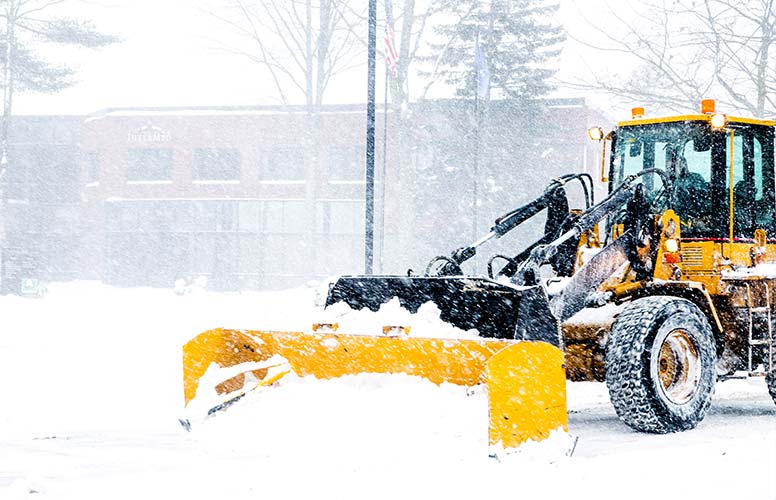What Does Lawn Renovation Mean? Everything You Need to Know About Lawn Reno
Are you considering lawn renovation but aren’t quite sure what it entails? You’ve come to the right place! In this post, we’ll give you a ...
It’s that time of year again…the time of year when getting out of your parking lot or driveway safely becomes a top priority.
In this post, we’ll examine the pros and cons of both snow removal methods in Maine so you can decide for yourself which is best for you.
Salt is an effective ice-melter because it lowers the freezing point of water, making it more difficult for ice to form.
It’s also relatively inexpensive and easy to apply. You can simply sprinkle salt on your driveway or pavement and then wait for the snow and ice to melt.
While salt is an effective ice-melter, it can also damage concrete and vegetation. Road salt, in particular, can be harmful to pets if they lick their paws after walking on a salted surface.
In addition, salt doesn’t work well in cold temperatures; below 20 degrees Fahrenheit, it becomes much less effective. Finally, salt can be messy, and tracking it into your home can be a hassle.
Sand is another effective way to improve traction on icy surfaces. It provides a gritty texture that gives tires something to grip onto as they drive over it.
Sand is also relatively inexpensive and easy to apply — you can sprinkle it on your driveway or parking lot, and then wait for the snow and ice to melt.
Like salt, sand can also be messy, and tracking it into your home can be a hassle. In addition, sand doesn’t melt ice; it only improves traction. This means that if there’s already a layer of ice on your driveway or pavement, sand will do nothing to melt it.
Finally, like salt, sand does not work well in cold temperatures; below 20 degrees Fahrenheit, it becomes much less effective.

Now that you know the pros and cons of salting and sanding, you can decide which method is best for you. Salting is probably your best bet if you’re looking for an effective way to melt ice quickly. However, sanding may be the better option if you’re concerned about damaging your concrete or vegetation.
Whatever you decide, we hope this has helped ensure a safe exit from your driveway or pavement this winter season!
You may have heard about pretreating your driveway or parking lot, but you may not be sure when the best time to do it is. The answer, unfortunately, is not cut and dry.
Pretreating depends on several factors, including the weather forecast and the types of chemicals you will be using. We’ll discuss all things pretreatment so that you can decide when to pretreat your own driveway or parking lot.
Pretreating your driveway or parking lot is a great way to keep it clear of snow and ice in the winter. However, it’s important to know when the best time is to pretreat.
The answer may vary depending on the weather forecast and the type of chemical you’ll be using. Here are a few things to consider when deciding whether or not to pretreat your pavement:
Pretreating your driveway or parking lot can be a great way to keep it clear all winter long. However, it’s important to consider all the factors before deciding whether or not it’s necessary. With a little planning, you can ensure your pavement stays safe and accessible all season long!
Icy conditions can be dangerous for pedestrians and drivers, so it’s essential that your driveway and parking lot are clear of ice before winter weather sets in. While you may be tempted to do this yourself, it’s best to leave the salting and sanding to the professionals.
With years of experience in deicing Maine driveways and parking lots, the Greencare Landscaping team is knowledgeable about the best products and techniques to use in order to keep your property safe. In addition, we have the equipment necessary to quickly and effectively remove ice from large areas. As a result, you can rest assured that your driveway or parking lot will be safe for both cars and pedestrians when the winter weather hits.
So if you’re looking for expert snow removal for your Southern Maine home or business, Greencare can help. Contact us today for a free estimate.